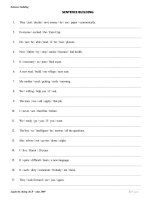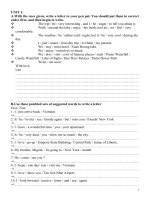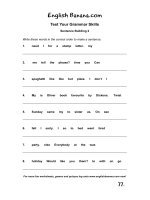Sentence building
Bạn đang xem bản rút gọn của tài liệu. Xem và tải ngay bản đầy đủ của tài liệu tại đây (183.7 KB, 12 trang )
Sentence building
I. SIMPLE SENTENCES
A. Affirmative Statements
1)
Subject Verb
My head and neck
The students
Hurt.
Studied and worked
2)
Subject Verb Complement
His friends
It
The students
We
My father
Her younger sister
The children
Their daughter
The boy
are
is snowing
are reading
don’t understand
owns
wants
are playing
taught
wants
smart. (adjective)
now. (adverb)
English. (noun)
her. (pronoun)
his own business. (noun phrase)
to study abroad. (verb phrase)
in the front yard. (prepositional phrase)
French at this school.
(noun + prepositional phrase)
to get married soon
(verb phrase + adverb)
3)
Subject Verb
Complement
Indirect Object Direct Object
He
They
teaches
bought
us
Mary
English.
some flowers.
Note: If the indirect object follows the direct, it is introduced by a preposition (to or
for)
EXAMPLE
Use the following sets of words and phrases to write complete sentences.
Their daughter / teach / French / this school / last year
Their daughter taught English at this school last year.
He / speak / write / English / equal / well
He speaks and writes English equally well.
B. Negative Statements
The Negative of a statement is expressed mainly in two ways:
1. With the Negative of Special Finite
Subject Special finite +NOT Complement
Alice
He
All of us
They
We
is not
cannot swim
are not working
will not be
have not arrived
an engineer.
across this river.
at this moment.
doctors.
yet.
2. With the Negative of Other Verbs
Subject do, does, did + NOT + V(-to) Complement
I
My teacher
Tom
do not know
does not enjoy
did not like
anybody here.
classical music.
coffee.
EXAMPLE
Use the following sets of words and phrases to write complete sentences.
I / not / know / if / he / telling / truth
I do not know if he is telling the truth.
He / not / able / come / because / his health problem
He was not able to come because of his health problem.
C. Interrogative Statements (Questions)
When forming a question, we place the auxiliary or the verb
be
before the subject. If
there is no auxiliary or
be
, we must use the correct form of do, does, did. After do, does, or did,
the simple form of the verb must be used.
1. Yes/No questions
Auxiliary Subject (Main Verb) Complement?
Is
Do
Will
Ho Chi Minh City
you
the committee
believe
decide
a major cultural centre?
what he tells you?
on the proposal today?
2. Negative Questions
Auxiliary Subject
(Main Verb) Complement?
Is
Isn't
Did
Doesn't
he
Anna
your parents
John
not
not
find
love
a student?
clever?
the car key?
animals?
3. Wh-Questions
a)
Who
,
what, or which
in subject questions
Who
What
Which
Verb Complement?
Who
What
Which
was
happened
is
the first to come?
last night?
You hat?
b)
Whom, what,
or
which
in complement questions
Whom
What
Which
Auxiliary Subject Verb Complement?
Whom
What
do
did
you
Peter
like
buy
most?
at the supermarket?
c)
When, where, how,
and
why
questions
When
Where
Why
How
Auxiliary Subject Verb Complement?
Why
When
don't
should
you
I
buy
end
some meat for dinner?
a letter with "Yours sincerely"?
4. Indirect Questions
a)
Subject Verb Question word Subject Verb Complement
I know why he Is happened. worried.
b)
Auxiliary Subject Verb
Question
word
Subject Verb Complement?
Do
Do
you
you
know
know
who
why
Tom
has been invited
was
to Claire's
dinner party?
absent from
class
yesterday?
EXAMPLE
Use the following sets of words and phrases to write complete sentences.
you / receive / letter yet?
Have you received the letter yet?
you / know / when / they / go / build / new house?
Do you know when they are going to build a new house?
II. COMPOUND SENTENCES
A. With Coordinating Conjunctions: and, but, so, for, or, yet, …
Independent clause, + Coordinating Conjunction + Independent Clause
We’re making good progress, but we’ve still got a long way to go.
He obviously doesn’t have a plan, or he would have said something.
She was often sad, and sometimes she didn’t eat her food.
EXAMPLE
Use the following sets of words and phrases to write complete sentences.
There / be / enough beds / so / I / have / sleep / floor
There are not enough beds, so I have to sleep on the floor.
We must / begin / plan / now / for / future / may / bring / unexpected changes
We must begin our plan now, for the future may bring about unexpected changes.
B. With Conjunctive Adverbs: however, nevertheless, moreover, furthermore,
accordingly, ...
Independent clause; + Conjunctive adverb, + Independent Clause
No formal complaint was made; accordingly, the police took no action.
It’s a difficult race; nevertheless, about 1,000 runners participate every year.
Many colleges do not have dormitories; however, they provide housing referral service.
EXAMPLE
Use the following sets of words and phrases to write complete
sentences.
It / difficult race / nevertheless / about 1,000 / runner / participate /
every year.
There / be / growing opposition / capital punishment / moreover /
there / be / now / evidence / many executed prisoners / innocent.
C. With Semicolons
Independent clause; Independent clause
Bob dominated Dave; Ken dominated me.
The American way of life apparently does not foster happiness; half of all the American marriages
end in divorce.
EXAMPLE
Use the following sets of words and phrases to write complete sentences.
Some people / keep dogs / pets / others / have / cats.
My older brother / study / law / my younger brother / study / medicine
III. COMPLEX SENTENCES
A. Adjective Clauses
1. With WHO, WHOM, WHICH, THAT, WHOSE
SUBJECT PRONOUNS
who, which, that
The student is from China. He sits next to me.
- The student who sits next to me is from China.
- The student that sits next to me is from China.
OBJECT PRONOUNS
who(m), which, that
I liked the woman. I met her at the party last night.
- I liked the woman who(m) I met at the party last night.
- I liked the woman that I met at the party last night.
- I liked the woman ∅ I met at the party last night.
OBJECT OF A PREPOSITION
who(m), that, ∅
The man was very kind. I talked to him yesterday.
- The man to who(m) I talked yesterday is very kind.
- The man who(m) I talked to yesterday is very kind
- The man that I talked to yesterday is very kind.
- The man ∅ I talked to yesterday is very kind.
POSSESSIVE
Whose
I know the boy. His bicycle was stolen.
- I know the boy whose bicycle was stolen.
I have a chair. One leg of which is broken.
- I have a chair whose one leg is broken.
EXAMPLE
Use the following sets of words and phrases to write complete sentences.
I want / speak / person / deals with / my account.
Dr Doran / secretary / resign / two weeks ago / have / had / do all / own typing
2. With
WHERE, WHEN
where = in which
The building is very old. He lives there.
The building in which he lives is very old.
The building where he lives is very old.
when = on which / at which
I’ll never forget the day. I met you then.
I’ll never forget the day when I met you.
I’ll never forget on which I met you.
EXAMPLE
Use the following sets of words and phrases to write complete sentences.
I / work / full-time / days / I / not / have classes
beach / be / place / I / like most / be / summer
B. Noun clauses









